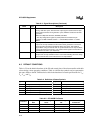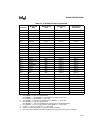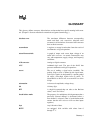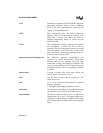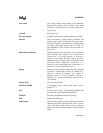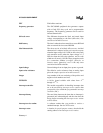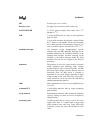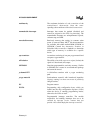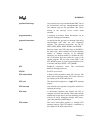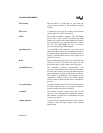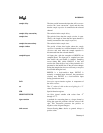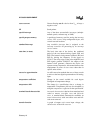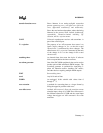
Glossary-4
87C196CB SUPPLEMENT
FET Field-effect transistor.
frequency generator The 8XC196MD peripheral that generates outputs
with a fixed 50% duty cycle and a programmable
frequency. The frequency generator can be used for
infrared transmission.
full-scale error The difference between the ideal and actual input
voltage corresponding to the final (full-scale) code
transition of an A/D converter.
hold latency The time it takes the microcontroller to assert HLDA#
after an external device asserts HOLD#.
ideal characteristic The characteristic of an ideal A/D converter. An ideal
characteristic is unique: its first code transition occurs
when the input voltage is 0.5 LSB, its full-scale (final)
code transition occurs when the input voltage is 1.5
LSB less than the full-scale reference, and its code
widths are all exactly 1.0 LSB. These properties result
in a conversion without zero-offset, full-scale, or
linearity errors. Quantizing error is the only error
seen in an ideal A/D converter.
input leakage Current leakage from an input pin to power or ground.
input series resistance The effective series resistance from an analog input
pin to the sample capacitor of an A/D converter.
integer Any member of the set consisting of the positive and
negative whole numbers and zero.
INTEGER A 16-bit, signed variable with values from –2
15
through +2
15
–1.
interrupt controller The module responsible for handling interrupts that
are to be serviced by interrupt service routines that
you provide. Also called the programmable interrupt
controller (PIC).
interrupt latency The total delay between the time that an interrupt is
generated (not acknowledged) and the time that the
device begins executing the interrupt service routine
or PTS routine.
interrupt service routine A software routine that you provide to service a
standard interrupt. See also PTS routine.
interrupt vector A location in special-purpose memory that holds the
starting address of an interrupt service routine.



